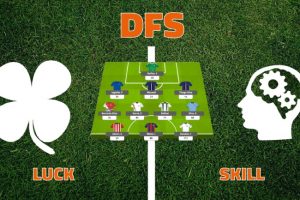 Daily fantasy sports (FFS) is among the fastest-growing gambling sectors, but it is also among the most controversial. That is not a surprise having in mind its specific nature. According to proponents of DFS, daily fantasy contests are based on skills, while DFS’ opponents argue that these are based on luck and hence considered to be illegal. Michigan is the next to join the pack of 16 other states aiming to regulate daily fantasy sports. Last week, Michigan lawmakers announced their plans to lift a long-standing federal ban on this type of gambling and introduce a bill that calls for regulating DFS betting industry and tax it.
Daily fantasy sports (FFS) is among the fastest-growing gambling sectors, but it is also among the most controversial. That is not a surprise having in mind its specific nature. According to proponents of DFS, daily fantasy contests are based on skills, while DFS’ opponents argue that these are based on luck and hence considered to be illegal. Michigan is the next to join the pack of 16 other states aiming to regulate daily fantasy sports. Last week, Michigan lawmakers announced their plans to lift a long-standing federal ban on this type of gambling and introduce a bill that calls for regulating DFS betting industry and tax it.
Michigan may be the next state to amend its current gambling laws in a manner that would regulate DFS within the state’s borders. Local media reported that the Michigan is pushing to break the chains of the old-dated federal ban also known as the Professional and Amateur Sports Protection Act (PASPA), loathed by both bettors and DFS operators. Under this act, sports betting is prohibited in most of the states with a few exceptions.
A bipartisan bill that gained the necessary support in the Senate would settle fantasy sports contests as games based on skill and knowledge, which is to differentiate the sector from games of chance. It was explained that daily fantasy sports allow players to pick a team of professional athletes and make predictions regarding the performance of the players based on their real-life performance.
A number of other states voted against the legalization of DFS and opened a good potential for the development of the gray sector. It is a public secret that daily fantasy sports have been operating in a regulatory gray area. This means that there was no particular law regarding the existence of DFS and players could still enjoy their favorite pastime, but the state was losing money in tax revenues. By regulating and taxing DFS, Michigan is to tap the leakage of money to the gray area and the state is to boost its economy. Apart from that, the regulations will provide a safe gaming environment, free of any traps for the players.
The bill gained support by the daily fantasy sports giants DraftKings and FanDuel, while MGM Grand and Greektown casinos in Detroit are at their odds over Michigan’s bid to legalize the provision of sports betting contests. It was explained that they are not against DFS, but against the proposed consumer protections and penalty provisions. MGM lobbyist Tyrone Sanders pointed out that the state should reconsider the costs and licensing fees for the operations of DFS across the state and secure equal rights.
What Does Michigan’s New Legislative Piece Say
 According to the new legislation, all players who would like to participate in daily fantasy sports contests should be at least 18 years old. The DFS operator will able to apply for a license which could cost $5,000 initially and $1,000 year-on-year. The bill would block DFS operators to offer youth, high school or college contests. It is interesting to note that these are measures introduced by all the states, which regulated the provision of DFS contests. Lawmakers explained that they are open to any proposals for improving the bill, but they reaffirmed their viewpoint that DFS contests are skill-based games and thus, eligible for regulating.
According to the new legislation, all players who would like to participate in daily fantasy sports contests should be at least 18 years old. The DFS operator will able to apply for a license which could cost $5,000 initially and $1,000 year-on-year. The bill would block DFS operators to offer youth, high school or college contests. It is interesting to note that these are measures introduced by all the states, which regulated the provision of DFS contests. Lawmakers explained that they are open to any proposals for improving the bill, but they reaffirmed their viewpoint that DFS contests are skill-based games and thus, eligible for regulating.



















